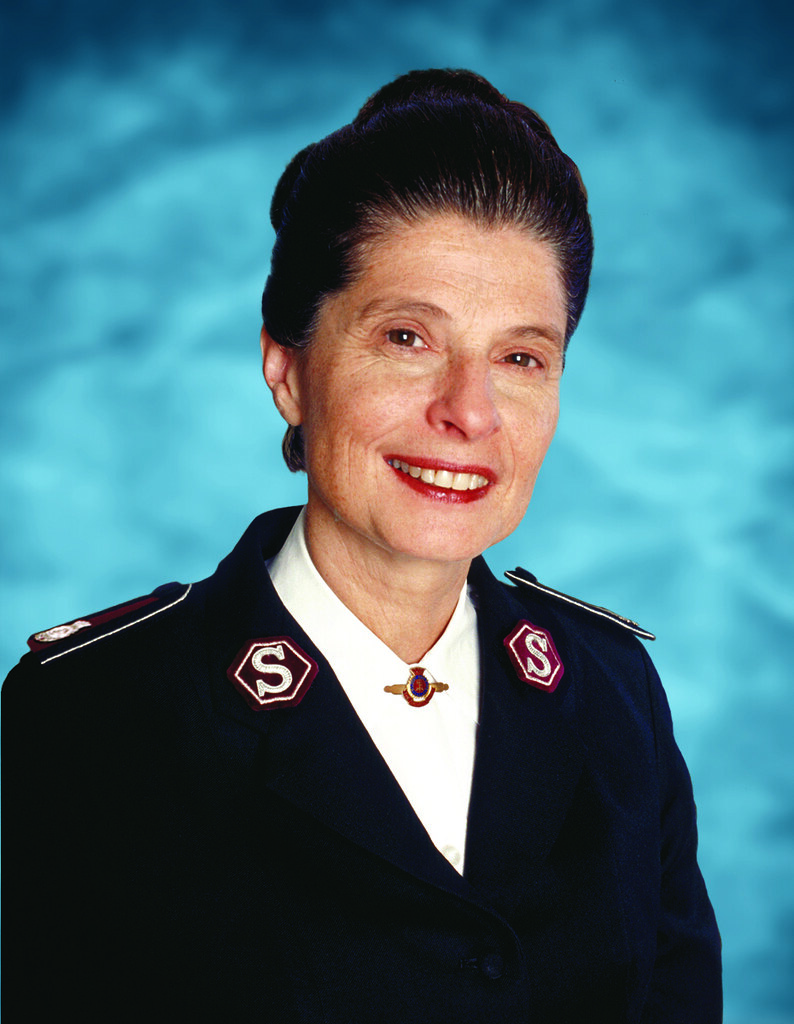COMMISSIONER CHRISTINE MaCMILLAN
Christine MacMillan was born in Montreal, Quebec, Canada, and grew up in Toronto, Ontario, where, following high school, she trained as a social services worker. Prior to entering The Salvation Army Training College in 1973, she served as a social service worker with Metropolitan Toronto Community Services and later as Director of Social Services with The Salvation Army in the City of North York, Ontario, and as a corps assistant with a congregation in Toronto.
In 1975, following her ordination as a Salvation Army officer, she was appointed to The Homestead, a treatment centre for women with addictions in Vancouver, British Columbia. During the fifteen years spent there, she earned professional qualifications as an addictions counsellor.
In 1976, she founded The Cross Walk, a drop-in centre and base for street work in Vancouver’s downtown eastside. In 1985, at the request of the Government of British Columbia, she founded the Kate Booth House, a haven for battered women and children. Throughout this period she participated in a major building project designed to provide residential facilities for women and children undergoing treatment for substance abuse. The centre opened in 1986. Throughout her Vancouver appointments, vital bridge-building methodologies were successfully established within Salvation Army Community Churches.
In 1990, she was transferred to London, England, where she chose to spend her orientation period living and working in Hopetown, a Salvation Army hostel for women in London’s East End – the same district in which William Booth founded The Salvation Army in 1865.
In 1991, she was appointed to The Salvation Army’s Social Services Headquarters in the United Kingdom Territory as the Associate Director of the London Homelessness Project which focused on addressing the challenges cited in a major study of homelessness and poverty undertaken by The Salvation Army. This project, with a price tag of £35 million, included more than 20 capital and program projects designed to effectively address a wide range of social concerns. Inclusive of this activity was the opening of an outreach corps.
In 1994, as Assistant Secretary for Operations, Social Services within the United Kingdom Territory enabled Christine to travel throughout the UK to develop program and evaluation strategies in both social services and corps (community church) centres.
In July, 1995, Christine was appointed back to the Canada and Bermuda Territory as the Territorial Director of Program – Social Services within the newly-integrated Social Services Department and in July of 1996 became the Assistant Social Services Secretary. In 1999 she was appointed as the Ontario East Divisional Secretary for Program, a role which encompasses social services and church ministry from a development, administrative, and pastoral perspective.
In 2000, Lieut.-Colonel MacMillan undertook a key leadership role in the Australia East Territory as the Secretary for Program. Later, in February of 2002, she was appointed Territorial Commander for the Papua New Guinea Territory – a needy, but vibrant expression of Salvation Army ministry in the developing world
In June 2003, with a promotion to the rank of Commissioner, Christine MacMillan was appointed as Territorial Commander and Territorial President of Women’s Ministries for the Canada and Bermuda. She also served as Chancellor of the William and Catherine Booth College, Winnipeg, Manitoba.
CANADA AND BERMUDA TERRITORY
COMMISSIONER CHRISTINE MACMILLAN

ASSUMED OFFICE: June 30, 2003 to June 30, 2007
PRECEDED BY: Commissioners Bill and Gwen Luttrell
SUCCEEDED BY: Commissioners William and Marilyn Francis





